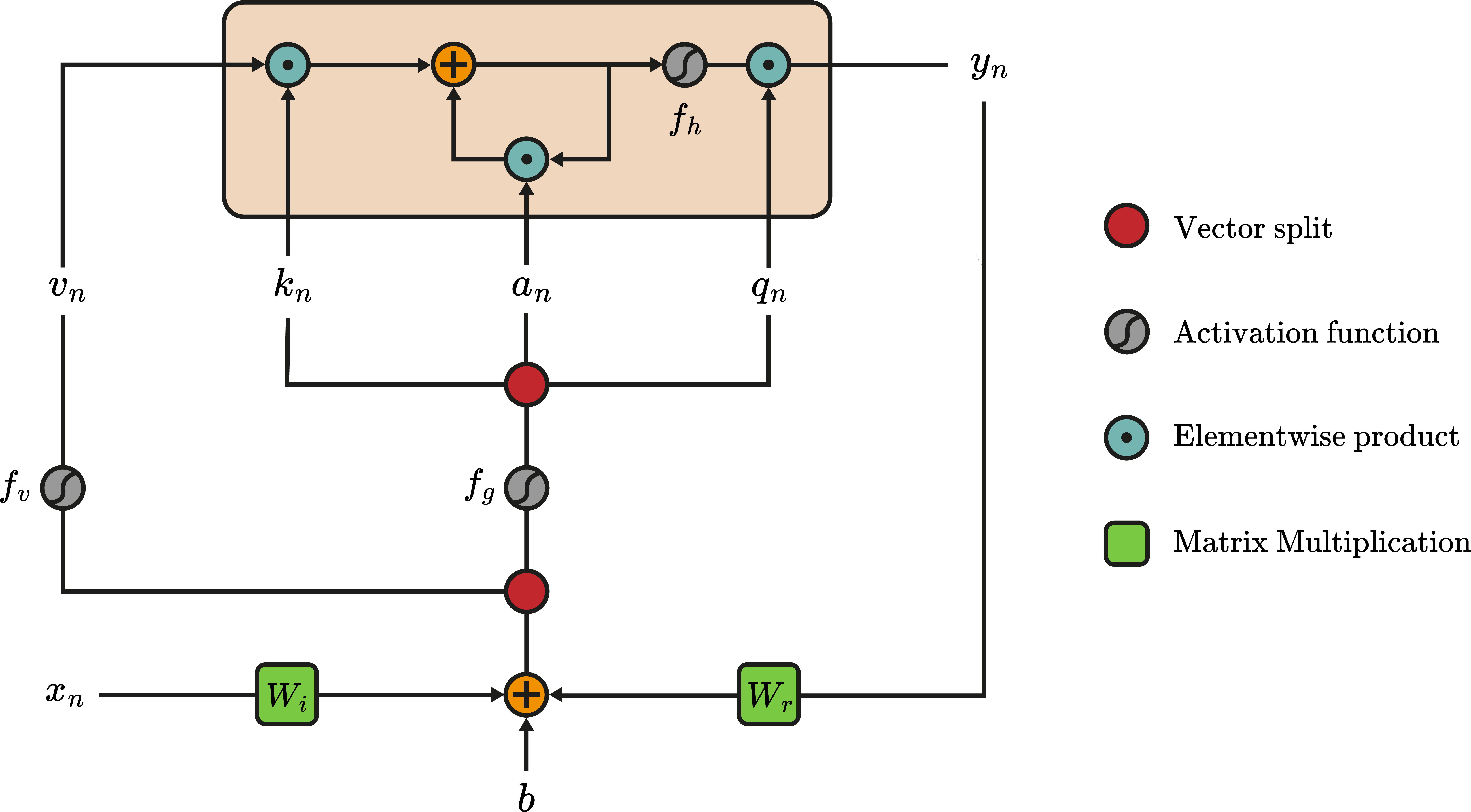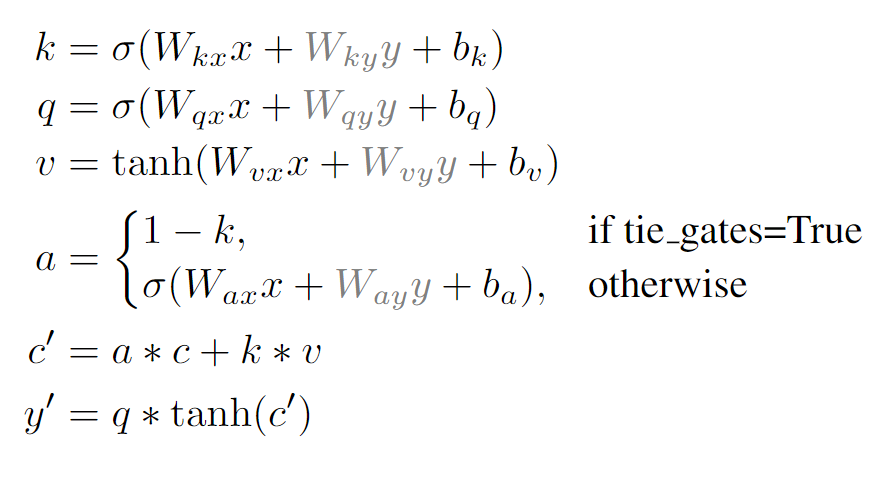GateLoop: Fully Data-Controlled Linear Recurrence for Sequence Modeling
Tobias Katsch*
Paper: https://arxiv.org/abs/2311.01927
Linear Gated RNNs (Mamba, GateLoop, HGRN) form a novel class of sequence models which generalize and generalize linear recurrent models such as S4, S5, LRU and RetNet, by employing data-controlled state transitions. While having a low cost linear complexity inference mode, they can be trained extremely efficient in parallel with logarithmic complexity making use of the highly optimized JAX associative scan implementation. This repository implements a practical gated linear recurrent model with default choices for input-, hidden- and gate activations and provides a drop-in replacement for causal multi-head-attention and a linear gated RNN language model architecture. Furthermore, linear gated RNNs can be used to train true recurrent models (GRU, LSTM) extremely fast by first training using associative scans and switching to a true recurrent mode (by enabling recurrent weights) for finetuning.
pip install flax-gated-linear-rnn:
Other requirements:
- JAX 0.4.20+
- FLAX 0.8.0+
We provide 2 main modules:
-
A causal time mixing sequence model which can be used as a drop-in replacement for causal multi-head-attention. Usage:
import jax import jax.numpy as jnp from flax import linen as nn from flax_gated_linear_rnn import GatedLinearRNN batch_size, sequence_length, input_dim, d_h, d_model = 2, 64, 16, 32, 18 key = jax.random.PRNGKey(0) x = jax.random.normal(key, (batch_size, sequence_length, input_dim)) model = GatedLinearRNN( d_model=d_model, d_h=d_h, input_activation=nn.tanh, hidden_activation=nn.tanh, gate_activation=nn.sigmoid, use_true_recurrence=False, use_tied_gates=True, ) params = model.init(jax.random.PRNGKey(1), x) carry, y = model.apply(params, x, carry=None) assert y.shape == (batch_size, sequence_length, d_model) assert carry.shape == (batch_size, d_h)carryholds the hidden model state, which can be used for fast linear complexity autoregressive inference.- Associative Recurrent Mode: (
use_true_recurrence=False) Extremely efficient training through associative scan. This disables the recurrent weights, allowing for much faster training compared to Transformer, GRU & LSTM. - True Recurrent Mode: (
use_true_recurrence=True) Can be used to train a more expressive model from a Linear Recurrent Model checkpoint. This variant introduces additional parameters such that the inputs and gates also depend on previous hidden states similar to GRU & LSTM. Due to the true recurrent nature, this mode cannot be parallelized and thus is less efficient. We recommend this for finetuning from an linear recurrent checkpoint.
- Disjoint Input & Forget gate (
use_tied_gates=False) Applies seperate projections for input- & forget gates - Tied Input & Forget gate (
use_tied_gates=True) Ties the input and forget gate through the relationforget_gate = 1-input_gate.
- Associative Recurrent Mode: (
-
A GatedLinearRNN-based language model.
import jax import jax.numpy as jnp from flax import linen as nn from flax_gated_linear_rnn import GatedLinearRNNLM # Model parameters n_layer = 4 d_model = 256 d_channel_mixing = 64 eps = 1e-6 channel_mixing_dropout = 0.1 time_mixing_dropout = 0.1 input_vocab_size = 10000 output_vocab_size = 10000 max_seq_length = 512 embedding_dropout = 0.1 use_word_embedding = True positional_encoding_mode = 'none' # 'none', 'learned', 'sinusoidal' d_h = 256 model = GatedLinearRNNLM( n_layer=n_layer, d_model=d_model, d_channel_mixing=d_channel_mixing, eps=eps, channel_mixing_dropout=channel_mixing_dropout, time_mixing_dropout=time_mixing_dropout, input_vocab_size=input_vocab_size, output_vocab_size=output_vocab_size, max_seq_length=max_seq_length, embedding_dropout=embedding_dropout, use_word_embedding=use_word_embedding, positional_encoding_mode=positional_encoding_mode, d_h=d_h, use_head=True, input_activation=nn.tanh, hidden_activation=nn.tanh, gate_activation=nn.sigmoid, use_true_recurrence=False, use_tied_gates=True, ) # Sample input batch_size = 32 x = jax.random.randint(jax.random.PRNGKey(0), (batch_size, max_seq_length), 0, input_vocab_size) # Initialize and apply model params = model.init(jax.random.PRNGKey(2), x, training=False) carry, y = model.apply(params, x, training=True, carry=None, rngs={'dropout': jax.random.PRNGKey(0)}) assert y.shape == (batch_size, max_seq_length, output_vocab_size) assert carry.shape == (batch_size, n_layer, d_h)carryholds the hidden GatedLinearRNN model states for all layers which can be used for fast linear complexity autoregressive inference.
https://tobiaskatsch.github.io/GatedLinearRNN/
If you use this codebase, please cite:
@misc{katsch2024GateLoop,
title={GateLoop: Fully Data-Controlled Linear Recurrence for Sequence Modeling},
author={Tobias Katsch},
year={2024},
eprint={2311.01927},
archivePrefix={arXiv},
primaryClass={cs.LG}
}

